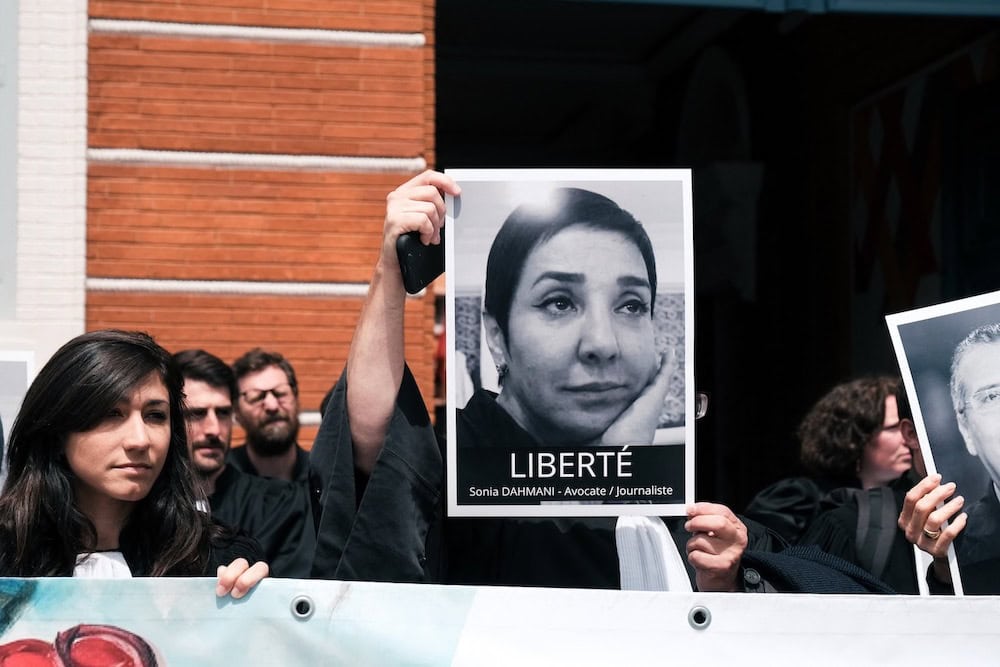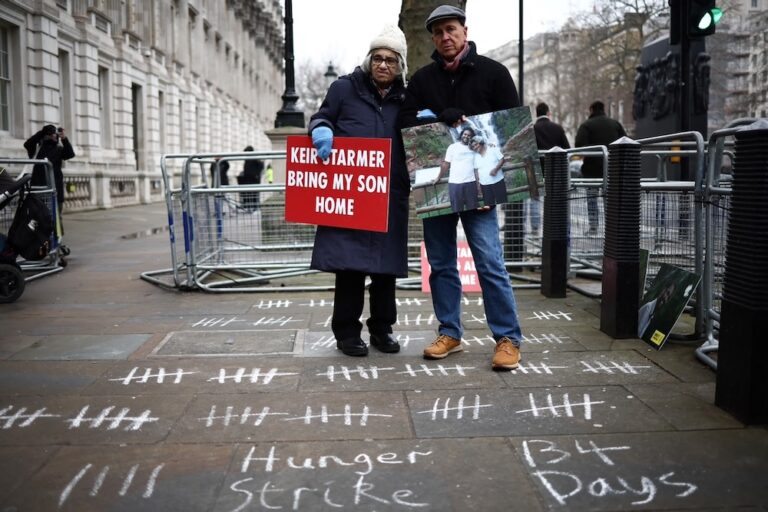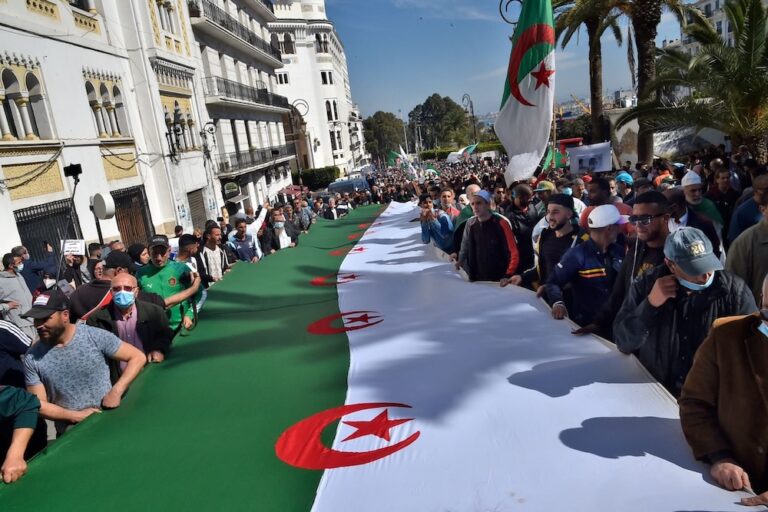July 2024 in MENA: A free expression and civic space round-up produced by IFEX's Regional Editor Naseem Tarawnah, based on IFEX member reports and news from the region.
Regional authorities escalate suppression of dissent and media ahead of elections. Censoring Palestinian narratives and restricting media access in Gaza. Harsh sentences for Saudi critics.
Shrinking civic spaces undermine elections in the region
Governments across the MENA region have intensified crackdowns on critical voices, civic space, and political opposition ahead of upcoming elections. In Tunisia, Algeria, and Jordan, authorities have increased efforts to stifle dissent, restrict media freedoms, and undermine electoral integrity. Vague laws continue to be used to prosecute journalists and activists for their free expression, while opposition figures face arbitrary detention, casting doubt over prospects for free and fair elections.
Tunisia’s pre-election crackdown on critical voices and political opposition continues to pose grave threats to free expression, civic space, and public participation. The country’s presidential elections on 6 October are taking place in a political landscape that appears increasingly bleak amidst a growing list of journalists, human rights defenders, and opposition leaders currently detained. Political candidates face restrictions and a climate of fear permeates the country, while conditions for a free and fair electoral process seem increasingly elusive.
One alarming development was the sentencing of lawyer and journalist Sonia Dahmani to one year in prison under the country’s controversial Decree 54, which outlaws the “spreading of false news.” Dahmani’s arrest and conviction came after she made sarcastic comments on television about the country’s treatment of sub-Saharan migrants. Tunisia’s journalists’ union called the verdict “a continuation of the dangerous deviation that has been observed for a year in the judicial treatment of press freedom cases”.
Dahmani’s case exemplifies how the Tunisian authorities are using vague legislation to stifle dissent and free expression, with Amnesty International and Human Rights Watch (HRW) warning that the decree is “methodically annihilating” the country’s hard-won freedoms.
Last month saw potential presidential candidate Lotfi Mraihi sentenced to eight months in prison and given a lifetime ban from running for office, while other opposition figures like Abir Moussi and Issam Chebbi have been jailed or have faced restrictions on their political activities. A Tunis court also issued a media gag order and restricted the movement of former health minister, political party leader and presidential candidate, Abdellatif Mekki.
The erosion of judicial independence has compounded these issues, with the authorities taking “drastic steps” to undermine the independence of the courts. Judges who have resisted these encroachments, including the president of the Tunisian Judges Association, Anas Hmedi, have faced reprisals in the form of criminal charges.
European Union member states have faced growing criticism for granting legitimacy to the Tunisian government’s repressive actions, turning a blind eye to the country’s human rights violations in the name of border control and counter-terrorism. The Tunisian government has been accused of committing “appalling violations” against migrants and refugees from sub-Saharan Africa, which include the use of racist rhetoric, mass deportations, and the arrest of civil society advocates, further restricting civic space and the ability of marginalised groups to participate in public life.
As Algeria prepares for presidential elections on 7 September, the government has intensified its crackdown on pro-democracy activists and independent journalists, raising concerns about the integrity of the electoral process. Louisa Hanoune, head of the Algerian Workers Party, withdrew from the presidential race, citing “unfair conditions” and a legal framework skewed to prevent opponents of President Abdelmadjid Tebboune from running. Eleven opposition figures denounced “the authoritarian climate” in an open letter and called for a democratic transition.
Eight Algerian activists from the pro-democracy Hirak movement have been placed in pre-trial detention, while six others were released under judicial supervision. The activists were arrested between 8 and 15 July in the city of Béjaïa, with the group being prosecuted under a broadened legal definition of “terrorism.”
Two journalists from the independent news website Algeria Scoop, Omar Ferhat and Sofiane Ghirous were also detained on charges of inciting hate speech following their reporting on a protest by businesswomen at a government-sponsored event. Authorities have also placed another Algeria Scoop journalist, Abdelaziz Laadjel, under judicial supervision.
These developments are part of a broader pattern of the Algerian government’s escalating crackdown on dissent, as evidenced by the detention of dozens of people over links to the Hirak protests, human rights activism, and critical online commentary.
In Jordan, upcoming parliamentary elections on 10 September will also be unfolding in an increasingly constricted space for dissent that raises grave concerns about the ability of Jordanians to freely exercise their rights and participate in the public sphere.
July saw authorities arrest prominent journalist Ahmed Hassan al-Zoubi, 11 months after he was fined and sentenced to one year in prison for a Facebook post criticising the government’s position on a transportation workers’ strike. Al-Zoubi was convicted under Jordan’s notorious cybercrime law for “provoking conflict.”
This case is part of a broader crackdown on civil society and human rights defenders that has intensified since Israel’s war on Gaza. Rights groups say security forces have resorted to intimidation, harassment, and force to suppress peaceful protests against Israel’s atrocities in Gaza, with human rights advocates, journalists, and protest leaders arrested and held in administrative detention without due process.
Jordan’s clampdown on dissent comes as the UN Human Rights Council recently adopted the outcome report for Jordan’s Universal Periodic Review, where rights groups condemned the government’s repression of civic space. But the government’s tactics extend beyond Jordan’s borders. Authorities reportedly refused to renew the passport of Moeen Al Harassis, a Jordanian political activist living in Turkey, in a blatant attempt to restrict his freedom of movement and part of a broader pattern of transnational repression.
Censoring Palestinian narratives and restricting media access in Gaza
As Israel’s onslaught in Gaza has claimed over 40,000 lives and displaced 90% of the besieged population at least once in the past nine months, calls for the protection of journalists and unhindered media access have intensified. The staggering human toll, which includes at least 158 Palestinian journalists covering the daily slaughter, continues to underscore the critical need to safeguard the press and ensure their ability to report on the ground without impediment.
In just a single 24-hour period last month, Israeli forces killed at least five journalists. On 5 June, an Israeli air strike hit the home of Saadi Madoukh, killing him and his colleague Ahmed Sukkar. The next day, strikes on the Nuseirat refugee camp, including an UNRWA-run school in Nuseirat where at least 7,000 people were sheltering, killed journalists Wafa Abu Dabaan, Amjad Jahjouh, and Rizq Abu Shakian. Compounding the tragedy, Jahjouh and Abu Dabaan were married, and their child was among the 10 victims killed in the attack.
With Israel continuing to kill Palestinian journalists trapped in Gaza, detain those in the Occupied Palestinian Territory, and restrict access to international media, the Committee to Protect Journalists (CPJ) and rights groups urged the Biden administration to press Israel on journalist killings and media access in Gaza during Prime Minister Netanyahu’s recent visit to Washington DC. More than 60 news organisations, including some of the world’s largest, also signed an open letter calling on Israel to immediately end restrictions on international media entering and reporting on Gaza.
Despite these mounting calls, Israel appears determined to continue restricting media access and controlling the narrative, further obstructing efforts to document and expose the full scale of the violence.
In the digital realm, Meta has failed to protect Palestinians from hate speech fuelling violence during the Israeli war on Gaza, rights groups warned last month. The social media giant’s latest update to its Hate Speech Policy potentially restricts criticism of Zionism by equating it with antisemitism, aligning with pressure to adopt the discredited IHRA definition and risking wider censorship of Palestinian narratives.
Government involvement in content moderation has also raised serious human rights concerns, as social media platforms have been challenged for unjustified takedowns of pro-Palestinian content at the request of the Israeli government. As IFEX member the Electronic Frontier Foundation highlights, this cooperation gives governments like Israel’s tremendous influence over content moderation, allowing them to control public dialogue and suppress dissent.
Compounding these digital restrictions, Microsoft blocked countless Skype and email accounts of Palestinians without warning, cutting them off from crucial online services and severing communication during a critical time.
In a positive step towards combating online threats and protecting users, 7amleh launched its Arabic Violence Indicator, an AI-powered linguistic model to monitor hate speech and violent content on Arabic social media. Building on a successful Hebrew indicator, the Arabic version has detected around 261,000 pieces of retroactive violent Arabic content since January 2024, with content primarily on Facebook and Twitter, and 48.6% being gender-based.
Saudi Arabia’s harsh sentences for online speech
In a troubling escalation of the Saudi government’s relentless repression, the number of executions in the kingdom has risen sharply, with 100 people reportedly put to death so far this year – a 42% increase compared to the same period in 2023. Many of these executions are for political offences rather than recognised common crimes, demonstrating the authorities’ use of the justice system as a tool to silence opposition.
This crackdown extends to the digital sphere as well. Prominent Saudi animator Abdulaziz Almuzaini revealed in a now-deleted video pleading for help that he was recently sentenced to 13 years in prison and a travel ban over a decades-old tweet and a slew of charges, including “supporting terrorism and homosexuality” through the Netflix series Masameer.
Similarly, teacher Asaad al-Ghamdi received a 20-year sentence for his peaceful social media activity, in what appears to be retaliation against his family members. Al-Ghamdi’s brothers are Muhammad al-Ghamdi, a retired teacher who was sentenced to death last year for his online activity, as well as prominent Islamic scholar and dissident, Dr. Saeed bin Nasser al-Ghamdi, who has been living in exile since 2018.
Rights groups called on authorities to immediately release various content creators and journalists, including Palestinian journalist and podcast presenter Hatem al-Najjar, who has been detained since January, and demanded an end to harassment of those exercising free expression.
In brief
In Egypt, authorities continued their crackdown on press freedom with the recent arrests and enforced disappearances of two journalists – cartoonist Ashraf Omar and reporter Khaled Mamdouh. Mamdouh was detained and held incommunicado for several days before being presented to prosecutors, while Omar was abducted from his home as a national political dialogue was underway to discuss reforms to Egypt’s extensive use of remand detention. Rights groups, including IFEX members Cartoonists Rights, Association for Freedom of Thought and Expression (AFTE), Reporters Without Borders (RSF), and CPJ condemned the arrests and called for the journalists’ release, as well as an end to arbitrary detentions.
Authorities also extended the pretrial detention of at least 125 people, many swept up in a wave of arrests following planned protests over declining economic conditions.
In Morocco, 2,476 prisoners were pardoned on 29 June, including prominent journalists Taoufik Bouachrine, Omar Radi, and Soulaimane Raisouni. The journalists were convicted on sex crime charges they denied. Rights groups consider these charges “another tool for authorities to punish journalists”. In March, Raisouni went on hunger strike after prison authorities prevented him from sending a letter to his wife.
New research by ARTICLE 19 reveals how over 5,000 LGBTQI+ individuals across 8 countries in MENA have faced persecution, with police weaponising dating, messaging, and social media apps to target the community. The findings underscore what tech companies can and should do to enhance safety and protection for LGBTQI+ users in the region.
In Lebanon, the killing of Lebanese journalist Issam Abdallah by Israeli forces in October 2023 sparked an international outcry for justice. RSF organised a roundtable on 2 July in Beirut, with human rights groups and Abdallah’s family reaffirming their commitment to accountability.
Independent investigations concluded Abdallah and his colleagues were deliberately targeted, but no legal proceedings have been initiated. Abdallah’s family filed a UN submission urging an investigation into the killing as a potential war crime and calling for criminal probes and reparations. The Lebanese government’s refusal to recognize the ICC’s jurisdiction has complicated the pursuit of justice.
Photojournalist Christina Assi, wounded in the same attack, carried the Olympic torch in honour of journalists killed and injured, keeping the spotlight on the need for protection.



